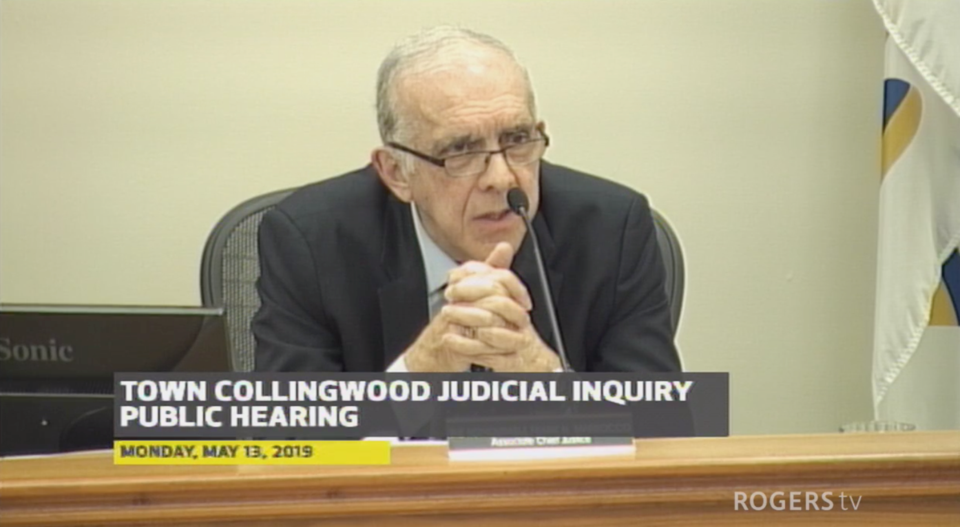A panel made up of integrity commissioners and city solicitors expressed hope Collingwood’s Judicial Inquiry would bring about change for municipal conflict of interest legislation across Ontario.
Today’s inquiry hearing featured testimony from Valerie Jepson, integrity commissioner for Toronto, Rick O’Connor, city solicitor for Ottawa, and David Wake, Ontario’s Integrity Commissioner, who together made up a panel to discuss municipal conflict of interest.
“We are very lucky as members of our society to have people who volunteer to run for elected office … to do the very difficult job we expect of them,” said Jepson. “We put in place some very high expectations, rightfully, that they put the public first. That’s an easy thing to say, but it’s a hard thing to live up to.”
All three panellists explained the training they offer in their positions to councillors in Toronto and Ottawa, and to MPPs at Queen’s Park.
They said it’s not possible for a councillor to understand the technicalities of something like the Municipal Conflict of Interest Act, and highlighted the importance of an integrity commissioner as a resource on all matters relating to conflicts.
“There’s a need to destigmatize discussions about this,” said Jepson. “We want elected officials to talk about these concepts without being fearful about the very fact that they’re asking questions is going to raise questions about whether or not they have integrity.”
Wake said he regularly talks to MPPs to train them in conflict of interest and remind them of the standards in place for their ethics and conduct.
“I tell them, ‘there’s no shame in having a conflict of interest, but there is shame in doing nothing about it,’” said Wake.
The three panellists said they seek to help elected officials in Toronto, Ottawa, and at Queen’s Park not only recognize a conflict, but what they should do in case of one. They encourage regular outreach from a councillor to their integrity commissioner with questions.
“I remind members they should have conflict of interest in mind every time they read an agenda,” said O’Connor.
The panel provided an overview of the acts and legislation currently governing conflict of interest at a municipal level, and at a provincial level.
There is a Municipal Conflict of Interest Act, and the emphasis in that act is on pecuniary interests where finances are involved.
As of March, 2019, every municipality in Ontario is required to have a code of conduct for elected officials. However, the province has not mandated the code of conduct have provisions about conflict of interest.
In the opinion of today’s panellists, that’s a shortfall in the legislation.
Though there’s some interpretation of case law that helps determine what is or isn’t a conflict of interest for elected officials, Jepson said it’s not ideal for councillors to have to navigate an act, a code of conduct, and case law to determine what is or isn’t a conflict for them.
“There’s a lot of legal uncertainty around the concept of apparent conflict of interest,” said Jepson. “What we can do is try to change the things we have to make them clearer … it would be helpful if the province required all codes of conduct to have a conflict of interest provision.”
O’Connor suggested Commissioner Frank Marrocco could make a recommendation in his report to change the definition of a “close relative” for the municipal conflict of interest act.
Finally, the panel suggested there’s a gap in Ontario’s municipal level legislation because there’s nothing requiring proactive financial disclosure.
According to a presentation prepared by Jepson and O’Connor, the provinces of Quebec, B.C., Saskatchewan, Newfoundland and Labrador, and Manitoba either require or permit municipalities to introduce personal financial disclosure systems.
In B.C., all elected officials, including local government officials, are required to make annual financial disclosures.
Jepson and O’Connor suggest the municipal act could introduce the same mandatory annual disclosure of private interests and, perhaps, even senior public officials. Those interests could include things like financial assets, liabilities, real property, debts, outside employment, and any directorships.
Today’s panel was part of the third phase of hearings for the Collingwood Judicial Inquiry. This phase is meant to help Associate Chief Justice Marrocco come up with recommendations for his final report. The third phase of hearings continue on Friday and will wrap up on Monday.
You can watch the hearings live at the town hall council chambers, on Rogers TV, or online here.


